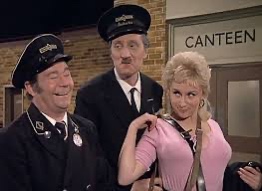
On The Buses was a 70s broadcasting phenomenon. Why?
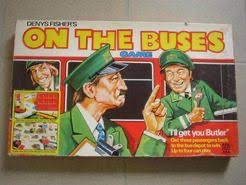
On The Buses was first broadcast on 28th February 1969 to something less than a fanfare. With an initial run of only 7 episodes it was popular enough to be re-commisioned for a second series. Within a couple of years it was the most popular sitcom on television, the spin-off film was the most successful British film at the box office in 1971 beating Diamonds Are Forever, Dirty Harry, A Clockwork Orange, The French Connection and Bedknobs And Broomsticks. Two more hugely successful spin-off films and a further six longer series followed. The series format was, implausibly for its very British subject matter, sold to a US network, Fisher Price brought out an On The Buses board game and the series was turned into a heavily bowdlerised strip cartoon which ran for four years in the children’s TV magazine Look-In (La-la-la-la-la Look-In!). Despite David Stubbs of The Guardian describing the show as ‘..a byword for 70s sitcom mediocrity..’ and Leslie Halliwell of Halliwell’s Film Guide calling the films ‘..deplorably witless..’, the series was massively popular throughout the early 70s. With Mrs Brown’s Boys recently winning the Best Sitcom at the BAFTAs, has anything really changed?
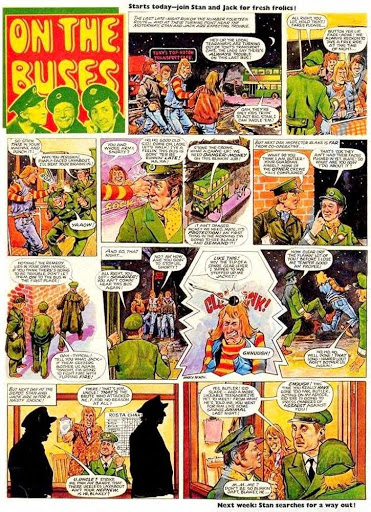
As is always the case here, it is important to remember that during the series’ successful run there were only three TV channels, so there was little or maybe no real competition. In fact, the first series of On The Buses in 1969 was most probably up against an episode of the long running western The Virginian on BBC1. Maybe viewers had become a bit bored of the Shilo Ranch every Friday night for nearly five years up till then. And hardly anyone watched BBC2. That particular night in 1969 viewers may have been more interested in The Visual Scene, a look at European architecture since 1945 on BBC2 than the new sitcom on ITV. But unlikely.
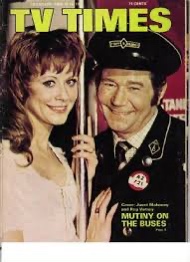
Throughout seven series the basic premise of the sitcom never changed, it just became increasingly more desperate. Reg Varney was 51 when he first played the part of Stan Butler and Bob Grant was 36. It’s not being unreasonable to say that neither had male model looks. Stan was overweight and short, Jack was skinny, toothsome and becoming follicaly challenged. However, a veritable battalion of young, attractive female clippies found them irresistibly sexy. And this was how it was in the 60s and 70s. Particularly with the Carry-Ons, young ‘dolly birds’ were only too happy to be draped around men like Sid James, Bernard Bresslaw or Peter Butterworth, or at least the films made out they were. But as viewers, we knew instinctively that this was fiction, but did this make it any more tolerable? It certainly made it more ludicrous.
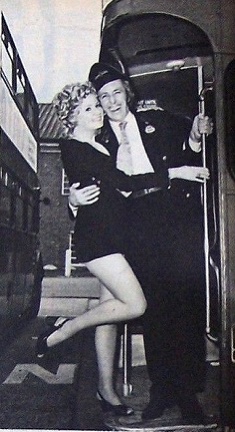
The series had been written by sitcom stalwarts Ronald Chesney and Ronald Wolfe. Wolfe had been the great Beryl Reid’s main writer before meeting Chesney while working on the BBC radio series Educating Archie, a comedy series starring a ventriloquist’s dummy. On the radio. If you think that’s weird, Ronald Chesney began in showbiz teaching the harmonica to troops during WW2 on a BBC radio series that lasted 42 weeks. That is, 42 weeks of harmonica tuition. And you thought European architecture since 1945 was boring?
Their first writing hit was the 1961 sitcom The Rag Trade which starred, amongst others, Reg Varney, who was already 45 at this point. About the everyday trials and tribulations in a clothes manufacturing sweat shop in London it also starred Miriam Karlin, Barbara Windsor, Sheila Hancock and Esma Cannon. A ratings success it attracted 11 million viewers at its height. They followed this with the formulaic Meet The Wife which ran for five series from 1964-66. Starring the legendary Thora Hird and Freddie Frinton it was another working-class sitcom which reflected the changing attitudes of broadcasting and film making at this time. Ronald Wolfe said:
‘Writers who come from orthodox middle-class backgrounds can’t write The Rag Trade- type shows. They just don’t know what makes the man in the street laugh.’
With regards to On The Buses maybe he had a point. With the notable exception of Galton and Simpson, many British sitcoms were solidly middle-class. After 1960 the most memorable sitcoms, however, were the likes of Steptoe and Son, Hancock, Till Death Us Do Part and The Likely Lads, factor in soap operas like Coronation Street and The Newcomers and clearly, it was possible, at last, to get into TV without having to have elocution lessons or graduate from private school. Although clearly lacking the social and political heft of many of these programmes, On The Buses had unquestionable working class credentials. It’s also fair to say Wolfe and Chesney, who have been roundly criticised for their representations of women in On The Buses, often rightly so, had already created strong roles for women in their previous work. No one could ever accuse either Beryl Read, Miriam Karlin or Thora Hird as being shrinking violets. But the two Ronalds were working during a very different time with regards to sexual politics and, let’s face it, writers will do anything for laughs, if they can get away with it and in the early 70s they could.
But what the two Ronalds were doing was no different to what pretty much all comedy writers were doing in the 60s and 70s. Writing for men by men. And the way we watch these programmes now is very different to how we watched them then. We watch them now with a large element of irony. We laugh because, at times, we can’t quite believe what we’re seeing or hearing. If you lived through those time, like I did, you completely believe what you’re seeing. It’s how things were. We know better now but I don’t agree with the people who think these things should be proscribed. We’re not stupid, we understand that things are different today so no one has the right to tell us what we should and shouldn’t be able to watch on terrestrial telly.
Reg Varney‘s career began immediately after the war when he, like so many other, mainly male, performers began at The Windmill Theatre (see Mad As A Ha’penny Watch’). He played piano there and this eventually led to him becoming, curiously, Benny Hill‘s straight man in a revue improbably titled ‘Gaytime.’
Benny Hill was reputed to have been offered the job over Peter Sellars. Some mention this with incredulity but, whatever they say, Benny Hill was a comic genius. Some of his stuff doesn’t go down well these days, like so much other 60s and 70s comedy, not least On The Buses, but there is no getting away from the fact that he was a brilliant comedy performer and an extremely clever and funny writer. There is nothing that Benny Hill did in some of his comedy that The Two Ronnies or even On The Buses didn’t, and they certainly didn’t do it as well as Benny Hill, but the latter are both broadcast regularly but Benny Hill shows never see the light of day. Why is Benny Hill criminally ignored? Are today’s viewers unable to cope with what they might see or be able to put it into a modern context? There is so much of his genius we are missing and it’s incredibly unfair. A few years ago a TV channel, Channel 4 maybe, ran a one-off documentary where they showed young people clips from Benny Hill shows and asked if he was still funny. They voted resoundingly that he was.
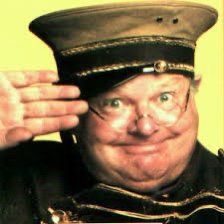
Before On The Buses, Reg Varney had established himself as a reliable comic actor in the The Rag Trade and then Beggar My Neighbour which ran for three series between 1966 and 68. With a plethora of 60s comedy talent including Peter Jones (also from The Rag Trade), June Whitfield and Pat Coombes, the premise of related couples living next door to one another and one couple being well-off and the other not, it was a comedy conceit made in TV heaven, though rarely remembered today.
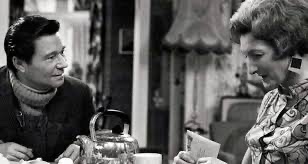
It was around this time in 1967 that Reg Varney became the first man to use an automated cash machine in the UK. Clearly his popularity with the public was of a suitably exalted status that the good people at Barclay’s Bank felt he was the right man to publicise this technological marvel. The fact that the first Barclay’s Bank to have an ATM was in Enfield, North London and Reg just happened to live locally also helped. But this unlikely story shows how well known he’d become. And this was before On The Buses.
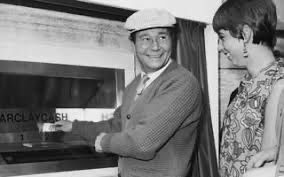
For the next four years he and Stan Butler became household names and it was the very success of On The Buses that really typecast Reg in the years after. He left OTB in 1973 and despite being given two series of his own largely forgotten sketch show in 1973-74 and starring in an On The Buses-type sitcom but set in Billingsgate Market, Down The ‘Gate, which only lasted 12 episodes, Varney rarely worked in TV again. Sadly, whatever he did he was always Stan Butler.
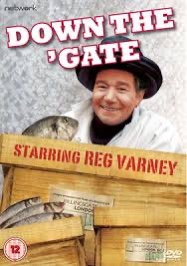
Reg did make a curiosity of a film in 1973 , however. Straight after leaving OTB he was offered The Best Pair Of Legs In The Business about a holiday camp entertainer who squanders his talent and family relationships due to his obsession with his job. With a pretty decent cast including Diana Coupland of Bless This House fame and Johnny ‘Mike Baldwin’ Briggs, it’s an odd combination of comedy and pathos and it can’t quite work out what it wants to be. Reg Varney is pretty good in it but he’s fighting a losing battle. Eventually the film was given a cinema release as second on the bill to, ironically, The Best of Benny Hill and sunk without trace. And that for Reg was pretty much it, which was a shame as he was a comedy actor of real ability and professionalism. His style seemed effortless and compared to some of the less talented actors in OTB, and there were plenty, he shone out like a number 11 bus on a cold winter’s night at the cemetery gates. And it was Reg himself who did more than anyone to make OTB the success it was. In less capable hands it would have never have left the depot.
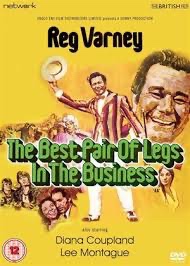
Compared to Reg the other performers could not hold a candle to him. That said, both Bob Grant and Stephen Lewis came to the show with interesting CVs.
Stephen Lewis began at Joan Littlewood’s Theatre Workshop at Stratford and actually wrote a West End musical, Sparrers Can’t Sing which was also made into a film starring Barbara Windsor. A life long socialist he often campaigned with Tony Benn and wrote some of the later OTB episodes with Bob Grant. He was given his own spin-off by Wolfe and Chesney ‘Don’t Drink The Water‘ which he starred in with the ubiquitous Pat Coombes as Blakey and his sister who had retired to Spain with hilarious results! You can imagine. Lots of funny foreigner, greasy food and Spanish tummy gags ensued. He reprised Blakey a number of times in various shows and finished up in that retirement home for old actors, The Last Of The Summer Wine.
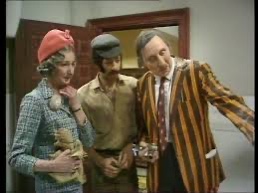
Bob Grant also began with Joan Littlewood’s theatre company and appeared in Lewis’s stage play of Sparrers Can’t Sing. He also played, oddly, 60s Labour Minister and old soak George Brown in the political satire written by Private Eye editor Richard Ingrams and John Wells, Mrs Wilson’s Diary before OTB. As well as writing later OTB episodes with Lewis, worked pretty much dried up for him after the series ended. He attempted a comeback with a self-written sitcom called Milk-O where he played a milkman fighting off the amorous advances of randy housewives (well they would, wouldn’t they?) but the pilot wasn’t taken up by any TV company. In 1975 a film was released by Special Branch‘s one-dimensional Derren Nesbitt which he scripted, produced and directed entitled The Amorous Milkman about a milkman fighting off the advances of randy housewives. Sound familiar? In fact, one poster for the film showed a cat licking its lips after drinking some milk above the tagline ‘If your pussy could talk.’ Saul Bass it wasn’t. 70s it certainly was.
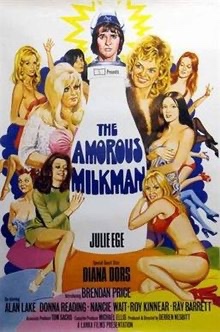
This was probably the last straw for Bob and his life descended into depression and after two suicide attempts a third attempt was, tragically, successful in 2003. During his OTB years of fame his marriage at a London Registry Office attracted such a huge crowd he and the guests had to abandon their hired cars and walk to the reception. Such are the vicissitudes of fame.
The first series of OTB set the parameters for the characters such as Arthur’s cynical and sarcastic nature and his verbal abuse of Olive (‘You great guts!‘), his ‘operation’ which is never revealed but it’s suggested affects his sexual performance (obviously). Olive does not have a particularly big role in the first two series other than as the butt of jokes. Her unattractiveness, terrible cooking and desire to have ‘an early night’, much to Jack’s disgust, are regular routines. Blakey is established as the petty hate figure that Stan and Jack run rings around and ‘clippies’ are introduced only occasionally. Stan’s problems are mostly the result of his doting mum and troublesome family. In fact the first two series are fairly low-key and often have an improvised feel to them. The comedy is slow burning to say the least and often it doesn’t emerge at all. One gets the impression the writers don’t really know where it’s going. It’s quite amazing that it was commissioned for a third series.
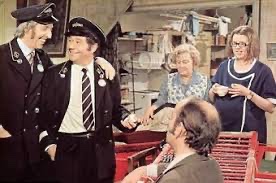
By series three however, they get into their stride. The catchphrases appear, ‘I ‘ate you butler,’ ‘Get that bleeding’ bus aht!‘, buxom clippies abound and Blakey gets annoyed. And that was, pretty much, the template for the next four series. Desperation still set in regularly though and in series three, for example, an episode about the boys getting fancy new uniforms really scraped the barrel, and a scene depicting Jack and Stan just mincing around the staff canteen in them went on for about 3 minutes! And this type of scene became increasingly more common as ideas became increasingly more limited.
The spin-off films were just extended versions of the TV series. The first film, On The Buses, which made 28 times its original budget world-wide, is a very 70s story of women threatening the harmony of the mens’ jobs and their guaranteed overtime by being ‘allowed’ to become bus drivers. High jinx ensue and a series of ploys to get the women bus drivers sacked are put into operation including spiders in the cabs and diuretics in the tea. The women drivers, of course, are all battle-axes. The clippies, of course, are the young attractive girls desperate for ageing, sweaty, overweight, leering male attention. To be fair, the denouement of the film did give the battle-axes the upper hand (spoiler alert, if you’re bothered) as they all became inspectors.

The most memorable aspect of the first film was the opening theme song, ‘Its A Great Life On The Buses‘ by Quinceharmon. Arguably the lyrics were funnier, in a very 70s way, to the script. For example:
It’s so romantic on the buses,
you’ll find it thrilling when you ride,
and you can get it on the buses,
upstairs or down inside.
Hardly Leonard Cohen but you get the idea.
Mutiny On The Buses and Holiday On The Buses wrung out the threadbare comedy sponge to its limit but, as is often the case, too little too late. Reg saw the writing on the lavatory wall and jumped the bus long before the cemetery gates in the middle of series 7. Michael Robbins (Arthur) had already done so at the start of series 7, supposedly having divorced Olive. He went on to have a much more successful subsequent career than any of the other OTB performers, including an unlikely part as a female impersonator in The Pink Panther Strikes Again in 1976.
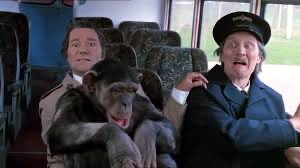
It’s not going too far to call On The Buses a 70s phenomenon. Quite unbelievable now given its paucity of humour and one-dimensional characters. It should also be remembered that at the same time we had comedy on telly such as Monty Python’s Flying Circus, Steptoe and Son, The Likely Lads, Porridge and The Dustbinmen. So it’s not as if OTB had no competition. But maybe Ronald Chesney was right about the working class humour, maybe many people didn’t want challenging comedy and maybe there was little competition at 7.00 pm on a Friday evening and only three channels available. But it was easy humour for less enlightened times and everyone of a certain age remembers Stan and Blakey. And I have to admit, I loved it at the time but I was only 9.
That said, give me On The Buses, or for that matter a look at European architecture since 1945, to the execrable Mrs Brown’s Boys any day.
Now get that bleeding’ bus aht!
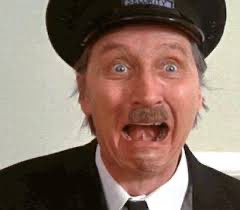
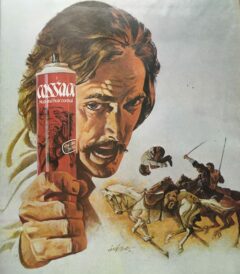
I feel the same way about ‘The Office’ with Ricky Gervais. To me it sucks big time. I love ‘On The Buses’.
Tastes differ, I guess.
[…] Cor Blimey Stan, How Did You Do It?: On The Buses […]
Get that bleedin’ bus ahhht!